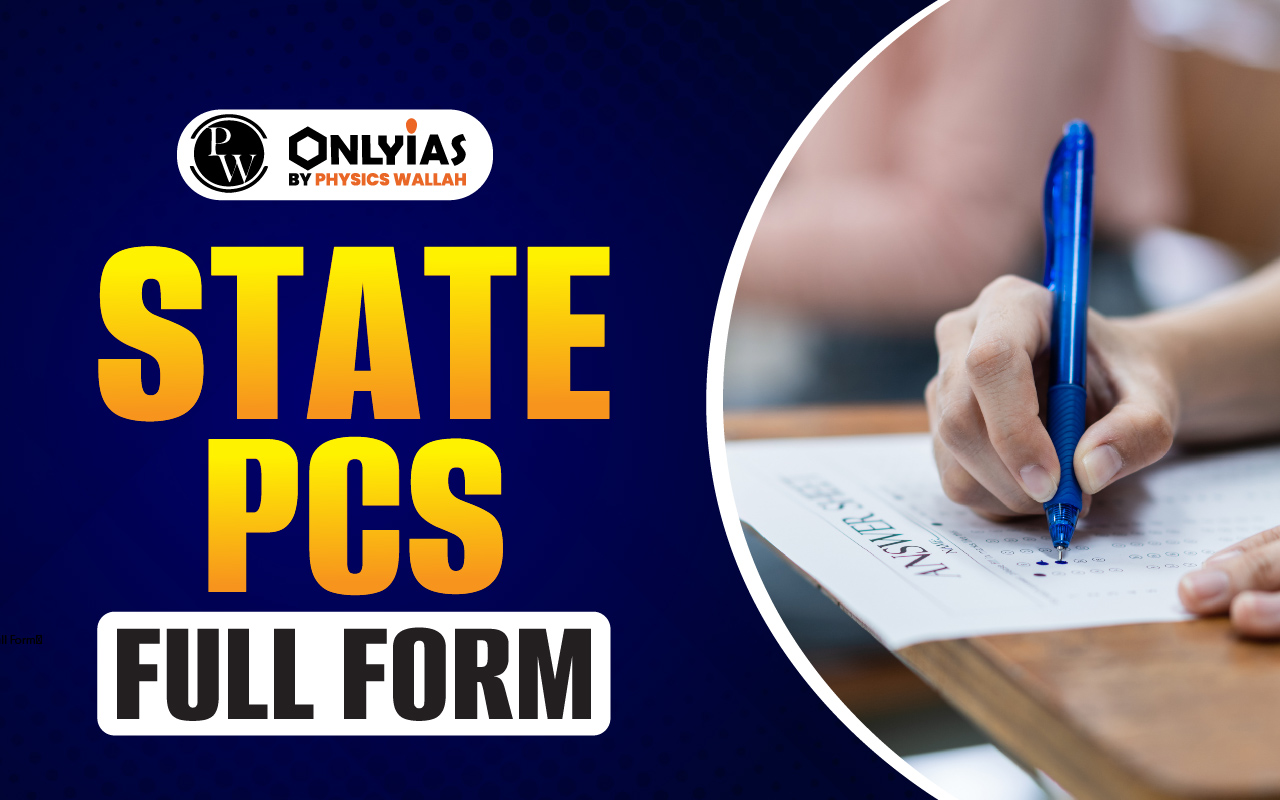PCS Full Form is Provincial Civil Service. Learn what the State PCS exam is, eligibility, posts, syllabus, and how PCS officers are selected for state administration.

State PCS Full Form is Provincial Civil Service. It is a state-level administrative civil service primarily aimed at managing executive roles within the jurisdiction of state governments. Each Indian state conducts its own PCS examination through the respective State Public Service Commission. These exams are designed to recruit Group A and Group B officers to serve in various administrative capacities within the state government.
Interested candidates must read on to understand the intricacies of the State PCS exam, including its full form, significance, eligibility, posts, exam pattern, and more.
The State PCS Full Form is Provincial Civil Service. This service functions under Group A and Group B of the state executive branch. It is a necessary part of state administration, serving as the backbone of policy implementation, public grievance redressal, and maintaining law and order within the state.
State PCS Exams are state-governed civil services, unlike the Indian Administrative Service (IAS), which functions under the Union Government. PCS officers are appointed directly by the Governor of the state and serve within their respective state boundaries.
| State PCS Overview | |
| Component | Details |
| State PCS Full Form | Provincial Civil Services |
| Conducting Authority | State Public Service Commissions (e.g., UPPSC for Uttar Pradesh) |
| Level of Exam | State-Level (Group A and Group B Services) |
| Exam Stages | Preliminary, Mains, Interview |
| Eligibility Criteria | Graduation from a recognised university; Age: 21 to 40 years |
| Citizenship | Indian Citizen |
| Number of Attempts | Varies by state and category (General/OBC/SC/ST) |
| Application Mode | Online through respective state PSC portals |
| Selection Posts | Deputy Collector, DSP, BDO, District Officers, Assistant Commissioners, etc. |
| Job Location | Within the respective state |
| Promotion Scope | Can be promoted to IAS through seniority and service record |
| Physical Fitness Requirement | Applicable for specific posts (e.g., DSP, Forest Officers) |
| Syllabus Coverage | General Studies, General Knowledge, Optional Subjects |
| Recruitment Frequency | Annual or as per state requirements |
The State PCS Exam is a competitive examination conducted annually by individual State Public Service Commissions to select eligible candidates for administrative positions. These positions are essential in implementing government policies, managing daily governance tasks, and maintaining law and order in the state.
This examination generally comprises three stages:
The entire selection process is structured to assess a candidate’s academic knowledge, administrative aptitude, decision-making ability, and general awareness.
The state PCS exam is conducted for a wide range of administrative and executive posts, depending on the requirements of the respective state government. Some of the top posts include:
The posts vary slightly from state to state, but all come with significant administrative responsibilities and decision-making powers.
Before applying, it is crucial to understand the State PCS exam eligibility criteria, which include educational qualifications, age limits, and physical standards (for certain posts).
If you’re wondering how to participate in the State PCS Exam, here is a simple step-by-step guide:
Though the PCS exam full form remains consistent as Provincial Civil Services, the syllabus differs slightly by state. However, most states follow a standard structure:
Candidates can choose from a range of optional subjects such as:
The role of PCS officers is central to local governance and administration. Common responsibilities include:
PCS officers are appointed within the state and do not hold inter-state authority, unlike IAS officers. However, their influence in district-level administration is significant.
A frequently asked question is the distinction between IAS and PCS officers. While both serve administrative roles, the IAS and PCS officers differ in their recruitment and scope of authority.
| Difference Between IAS and PCS Officers | ||
| Feature | IAS | PCS |
| Appointing Authority | President of India | Governor of the State |
| Exam Conducted By | Union Public Service Commission | State Public Service Commission |
| Jurisdiction | National | State-specific |
| Career Growth | Wider and Central Level | State-level, though promotion to IAS possible |
| Transfer | Across states | Within the respective state |
IAS officers are part of the All India Services, whereas PCS officers are recruited directly for state administration.
Understanding the State PCS Full Form, as Provincial Civil Service, offers deeper insights into the structure, responsibilities, and significance of this prestigious state service. For aspirants aiming for impactful careers in state governance, the PCS exam is a gateway to influential administrative roles. It is not just an examination—it is a commitment to public service, law and order, and state development.
Ready to boost your UPSC 2026 preparation? Join PW’s UPSC online courses today!
Check Out UPSC CSE Books
Visit PW Store
The State PCS Full Form is Provincial Civil Service, referring to a state-level administrative service under Group A and B posts.
The State PCS Exam is a competitive exam conducted by State Public Service Commissions to recruit candidates for various administrative roles.
The exam offers posts such as Deputy Collector, DSP, BDO, Assistant Commissioner, and other key state administrative positions.
Candidates must have a bachelor’s degree, be 21–40 years of age, and meet physical criteria for certain posts like DSP or Forest Officer.
Candidates must apply through the respective State PSC portal, qualify prelims, mains, and interview to be selected.
Yes, for specific posts like Dy. Superintendent of Police and Excise Inspector, candidates must meet prescribed physical standards.
पीसीएस का मतलब प्रोविंशियल सिविल सर्विस (Provincial Civil Service) है, जिसे हिंदी में प्रांतीय सिविल सेवा कहा जाता है। जो भारत में राज्य-स्तरीय प्रशासनिक सेवा है, जिसके अधिकारी राज्य सरकारों के विभिन्न विभागों और कार्यकारी पदों को संभालते हैं और इनकी भर्ती राज्य लोक सेवा आयोग (PSC) द्वारा की जाती है.
<div class="new-fform">
</div>